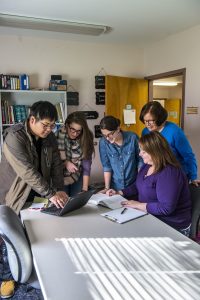Graduate Course Descriptions

Our graduate curriculum offers core classes that focus on practice methods, policy, research methods, and human behavior and the social environment. Field practica allow students to apply and expand their knowledge in community-based experiential learning. Electives provide an opportunity for students to specialize their education to suit their particular interests.
This listing is meant to give both prospective and current students a general outline of the courses that are typically offered by the School of Social Work. Certain courses, particularly electives, may not be reflected in this list. Students are encouraged to visit the University of Maine Graduate Catalog or to contact the School of Social Work for an up-to-date listing of currently offered courses.
Generalist Curriculum
SWK 550 Human Behavior and the Social Environment I
Examines research and traditional/alternative theories related to normative life span development as influenced by age, gender, social class, social structures, oppression, and other environmental factors. Uses a systems theory and person-in-environment as the analytical framework. Considers implications for social work practice and social welfare policy. 3 cr.
SWK 650 Human Behavior and the Social Environment II
Examines research and traditional/alternative theories related to normative development of families, small groups, and communities. Explores the impact of age, gender, social class, social structures, oppression, and other environmental factors. Examines the social structure and context of organizations and institutions and their impact on individuals, families, small groups, and communities. Considers implications for social work practice and social welfare policy. 3 cr.
SWK 560 Practice in Generalist Social Work I
Develops knowledge, values and skills necessary for direct practice of generalist social work with small systems, including individuals, small groups and families. Covers social systems and problem solving framework. 3 cr.
SWK 563 Practice in Generalist Social Work II
Topics include theory and practice of purposive social change in social agencies and communities, participation of social workers in politics, and social worker roles as advocate, resource mobilizer, program planner and organizer. Integrates classroom and field experience. Prerequisite: SWK 560. 3 cr.
SWK 540 Social Welfare Policy and Issues for Generalist Practitioners
Analysis of the provision of social services and the interrelatedness of practice and policy analysis with emphasis on dimensions of choice in social welfare policy and major issues. 3 cr.
SWK 595 Field Practicum in Social Work
Supervised generalist social work practice in community agencies provides opportunities to apply social work knowledge and skills toward planned intervention and change efforts. 4 cr.
Advanced Standing Bridging Courses
SWK 530 Advanced Standing Bridging Course – Social Welfare Policy
Analysis of social welfare policies for social work practice. Must be an advanced standing MSW student. 2 cr.
SWK 531 Advanced Standing Bridging Course – Social Work Practice
Integration of generalist knowledge, values and skills with application to simulated and actual social work practice situations. Must be an advanced standing MSW student. 2 cr.
SWK 533 Advanced Standing Bridging Course – Human Behavior and the Social Environment
Utilizes multiple theoretical approaches for understanding human behavior in the social environment. Must be an an advanced standing MSW student. 2 cr.
Specialized Curriculum
SWK 640 Issues in Social Welfare Policy for Advanced Generalist Practitioners
Social welfare policy analysis and evaluation with emphasis on skills in the use of government data, policy advocacy and analytic decision-making related to social welfare and advanced generalist social work practice. Prerequisites: SWK 540, SWK 563 or SWK 530 or permission. 3 cr.
SWK 691 Advanced Social Work Research I
Application of social work research methods to the evaluation of social work practice, programs, and policy-making. 3 cr.
SWK 692 Advanced Social Work Research II
Application of social work research methods to social work research project. Prerequisite: SWK 691. 3 cr.
SWK 661 Advanced Generalist Social Work Practice with Individuals
Develops knowledge, skills and values necessary for advanced generalist social work practice with individuals, across the lifespan. Prerequisite: SWK 563 or SWK 531. 3 cr.
SWK 664 Advanced Generalist Social Work Practice with Families and Small Groups
Develops knowledge, skills and values necessary for advanced generalist social work practice with families and small groups. Prerequisites: SWK 661 and SWK 665. 3 cr.
SWK 665 Advanced Generalist Social Work Practice with Communities and Organizations
Develops knowledge, skills and values necessary for advanced generalist social work practice with organizations and communities. Prerequisite: SWK 563 or SWK 531. 3 cr.
SWK 600 Advanced Integrative Professional Seminar
Considers multi-disciplinary knowledge bases that inform advanced social work practice from a generalist perspective as well as the purposes of the profession, professional role, skill, policy applications and evaluation of practice. Prerequisites: SWK 661 and SWK 665. 3 cr.
SWK 695 Advanced Field Practicum in Social Work
Advanced generalist social work practice in community agencies. Provides students the opportunity to apply advanced social work knowledge and skills directed toward planned intervention and change efforts. Prerequisite: SWK 595 or SWK 531. 1-5 cr.
Electives
3 credit electives:
SWK 571 Trauma: Theory, Assessment, and Treatment
SWK 577 Group Strategies in Health/Mental Health Settings
SWK 580 Adult and Child Psychopathology
SWK 585Assessment and Intervention in Substance Use Disorder
SWK 586 Advanced Clinical Social Work Practice in Integrated Behavioral Healthcare
SWK 597 Yoga in Social Work Practice
SWK 597 PTSD/Toxic Stress, Neuroplasticity, Mood Disorders, and Clinical Interventions
SWK 597 Spirituality and Social Work
SWK 597 Social Work Practice with Children and Adolescents
There are three interdisciplinary courses related to aging (GRN 500, 501, 502) and one
interdisciplinary course on disability (DIS 530); these courses are taught primarily by social
work faculty.
We also have some 1-credit electives taught over the 3-week winter session and during the
summer, including one that covers the required content on intimate partner abuse needed for
licensing.
